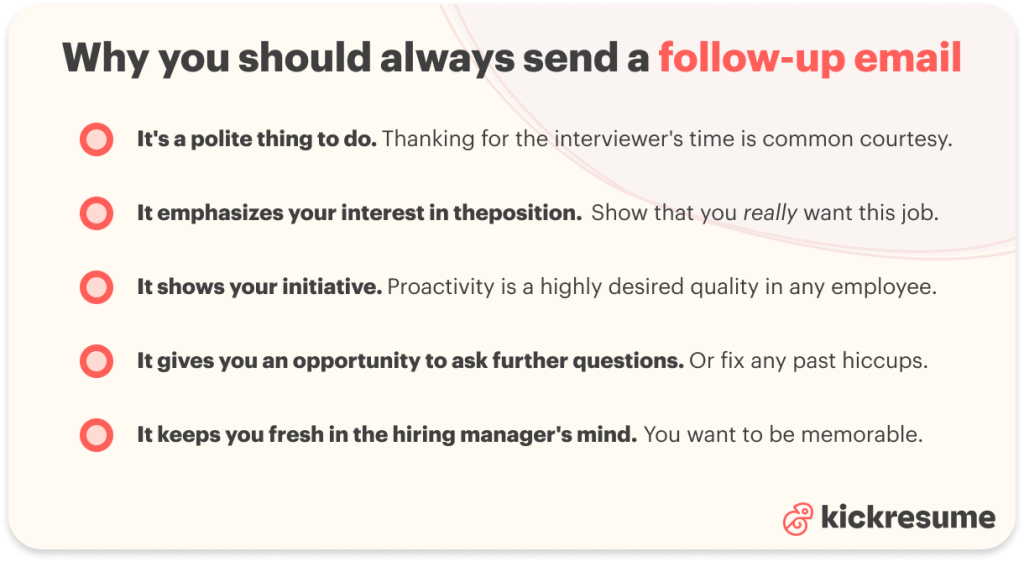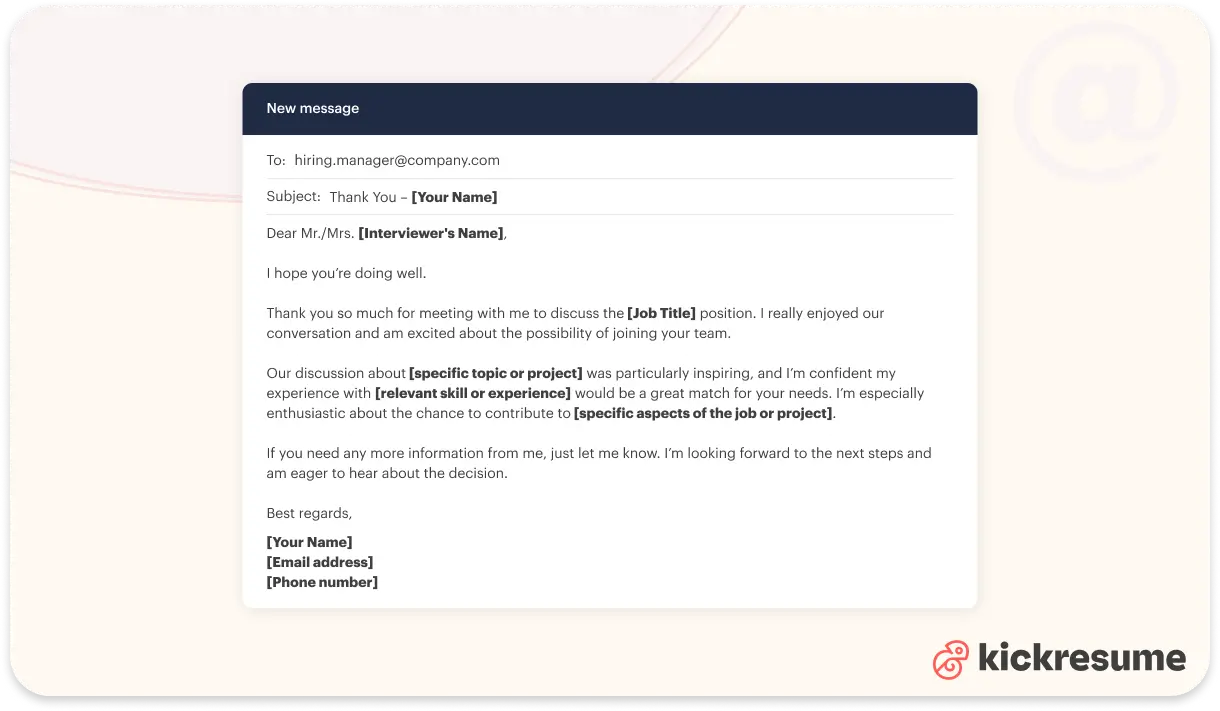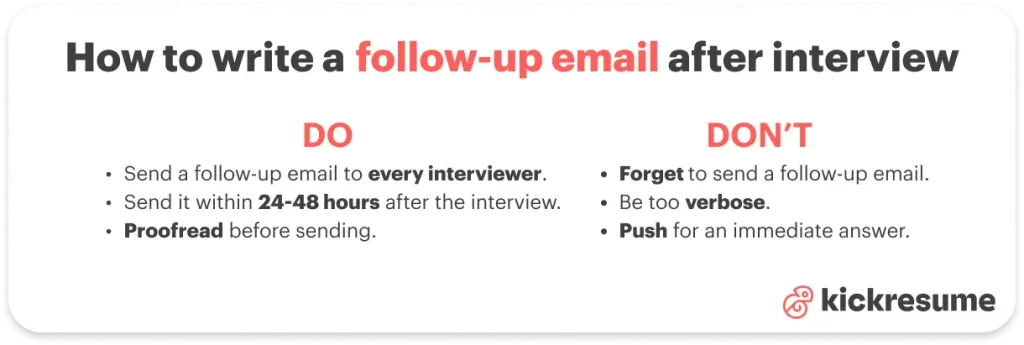Nailing the job interview already feels like a huge win, and all you want to do now is relax. But before you do that, don’t forget to send a follow up email after interview to keep the momentum going.
And yes, you may feel like sending a follow-up email after an interview is too pushy or makes you seem too eager.
But still, it's a step you don't want to skip.
Because sending a quick, thoughtful note after the interview rounds isn't just a polite gesture. It's yet another opportunity to show off your professionalism and emphasize your interest in the role.
But what should a follow-up email actually include? How soon do you need to send it? And what if you already sent one follow-up email and got no answer?
We're here to guide you through it, and even include some examples you can download or simply copy & paste.
- But first, what is a follow-up email after interview?
- Why you should always send a follow up email
- How to write a follow up email after an interview in 6 steps
- After interview follow up email example
- After interview follow up email templates
- Extra tips for your follow up email after interview
- Steer clear of these follow up email mistakes
- Key takeaways: Follow-up email after interview
But first, what is a follow-up email after interview?
As the name (subtly) suggests, a follow up email after an interview is a brief, polite message you send to your interviewer after your meeting.
Content-wise, it's your chance to:
- thank them for their time,
- express your continued interest in the role,
- and remind them why you’re a great fit for the position.
In short, this email keeps you on their radar and can influence their decision in your favor. It’s a small step, yes, but one that can make a big difference in your job search!
Why you should always send a follow up email
None of your friends are sending them, and the hiring manager didn’t mention you need to. So why bother spending time crafting a follow up email after an interview at all?
Numbers will do the talking...
68% of hiring managers agree on the importance of sending a follow-up and 1 in 5 interviewers actually admit to ruling out a job candidate because they didn't receive a thank-you email after their interview, according to this survey.
What can we say — it's always the little things!
And if you're still not fully convinced, here are some more reasons why you should always send a follow up email after interview:
- It's a polite thing to do. Firstly, thanking the hiring managers for their time is simply an act of common courtesy. They’re busy people who took the time to meet with you.
- It emphasizes your interest in the job. Secondly, it's another way to show that you truly appreciate the opportunity and are eager to seize it.
- It shows your initiative. By sending a follow-up email you're basically saying “I'm really serious about this opportunity and willing to go the extra mile.”
- It gives you an opportunity to ask further questions. Plus, if there were any points you wanted to clarify or additional details you need about the role, this is the perfect place to bring them up.
- It keeps you fresh in their minds. Hiring managers often juggle multiple candidates at once, and a follow-up email helps keep you top of mind.
The sad truth is that despite its many pros, follow-up emails rarely get the love they deserve. But this is good news for you because sending a follow up email after interview will make you stand out from the other candidates who didn't take that extra step.

How to write a follow up email after an interview in 6 steps
Here's the thing — writing a follow up email isn't difficult at all.
In fact, it’s a fairly straightforward process that, when done right, can make a significant difference in your job search.
Here's how you can craft the perfect follow up email after interview in just 6 steps:
- Start with a simple subject line.
The hiring manager needs to know what the email is about as soon as it lands in their inbox. For example, a simple and direct subject line like "Thank You – [Your Name]" or "Follow Up on [Position Name] Interview" works well.
- Continue with a personalized greeting.
Addressing the interviewer by their name, is one of those details that shows your respect and appreciation for their role in the hiring process. For example: "Dear Mr./Mrs. [Last Name],"
- Voice your gratitude for their time and consideration.
Next, start the body of your email by thanking the interviewer for their time. This helps you set a positive tone and show just how much you value the opportunity.
- Emphasize your interest in the job position.
After thanking them, share your excitement about the job and the company. You can also mention something specific you've learned during the interview (a project/initiative) and how it aligns with your skills or career goals.
- Clear up any last questions or details.
Were there any questions during the interview that you didn’t fully answer, or something you wish you could’ve explained better? Maybe there was something you wanted to ask but forgot? Well, now’s your chance to address it.
- Close your email with a friendly and professional sign-off.
Lastly, thank the hiring manager once more and let them know you’re excited to hear back and discuss what comes next. Additionally, include a classic sign-off phrase like "Best regards," or "Sincerely," to keep things professional.
After interview follow up email example
Curious to see what a good follow-up email after interview can look like? Here's a quick example:
After interview follow up email example
After interview follow up email templates
Let’s be honest — writing follow-up emails can be a bit tricky for many. That’s why we’ve put together some handy templates to make things a whole lot easier.
Short and sweet follow-up email after interview
In case you're one of God's favorites, your job interview went smoothly and you left the room convinced that you’ve given it your all.
Congratulations, you lucky person! All your follow-up email needs to be is short and sweet. Something like this:
#1 After interview follow up email template

The “I still need to clarify something” follow-up email after interview
You know how it goes — everybody has a plan until they get punched in the mouth asked an interview question they didn't see coming.
Of course, there are common interview questions you can prepare for without any problems.
But there's also a whole lot of different situational or even behavioral questions that can catch you off guard.
And, in situations like these, we’re often nowhere near as articulate as we’d like to be. If this is also your case, you can clarify any misunderstandings in your follow-up email like so:
#2 After interview follow up email template
The “I forgot to ask about something” follow-up email after interview
In a similar vein, the mix of stress, anticipation, excitement, and a touch of good ol’ anxiety can make us forget even our own name. So, it's no wonder that in the heat of the moment, we might forget to ask some key questions.
But the good news is that your follow-up email can fix this mistake (Just copy and paste the text and then adjust as needed):
#3 After interview follow up email template
Second follow-up email template
And finally, it might be that you’ve already sent one follow-up email. A week goes by. Two weeks go by. And you still haven’t heard back from anyone.
Of course, it’s possible that the hiring manager is ghosting you, but it’s more likely that your email simply got lost in the digital void.
In that case, you should absolutely go for it and send another follow-up email.
#4 After interview follow up email template
Extra tips for your follow up email after interview
Do you want your after interview follow up email to truly stick the landing? Well then, don't miss out on these neat little tips:
- Send a follow-up email to every interviewer. If you spoke with multiple people, make sure to send a personalized follow-up to each. For example, if someone talked about team dynamics, say how excited you are to contribute.
- Timing is everything. The best time to send a follow-up email is within 24-48 hours after the interview. Getting in touch within this window will help keep your candidacy fresh in the interviewer's mind.
- Proofread before sending. Of course, you want to catch any typos or grammatical errors you might've made. Because no matter how perfect your email is, small mistakes like these can make you look unprofessional and careless.
Don't forget that making a positive lasting impression is just as valuable as the first one. So make sure you don't overlook anything.
Steer clear of these follow up email mistakes
Of course, you want your email to be perfect. But making mistakes that can undermine your efforts is really easy. Here’re some of the most common pitfalls you should be wary of:
- Not sending a follow-up email. You know how it is — closed mouths don't get fed. And not sending a quick email after your interview can cost you dearly. You should always send one even if you think that the interview didn't go well.
- Being too verbose. Secondly, your email needs to be concise! If it's too long, it can lose the reader’s attention and dilute your main message. And you definitely don't want that!
- Pushing for an immediate answer. Sure, you really can't wait to hear back. But demanding a quick response can be off-putting. Instead, express your appreciation politely without creating any pressure.
And remember, patience is a virtue — especially when it comes to job hunting. So, sit tight, avoid sending daily emails, and maybe even take up a new hobby while you wait.

Key takeaways: Follow-up email after interview
In conclusion, an after-interview follow-up email is a short message you send to the people who interviewed you after your meeting.
It may seem like a minor detail, but it can make a big difference in landing the job!
Here's why you shouldn't overlook its impact:
- It's a gesture of gratitude towards the hiring managers who took time out of their busy schedules to meet with you.
- It shows that you truly appreciate the opportunity and are eager to be part of the company.
- It conveys that you are serious about the opportunity and willing to go the extra mile to secure it.
- It provides a perfect platform to address any lingering questions or seek additional information about the role.
- Lastly, a follow-up email keeps you fresh in the minds of the hiring managers.
You can create an effective follow-up email simply by following this structure:
- Start with a simple subject line.
- Continue with a personalized greeting.
- Voice your gratitude for their time and consideration.
- Emphasize your interest in the job position.
- Clear up any last questions or details.
- Close your email with a friendly and professional sign-off.



